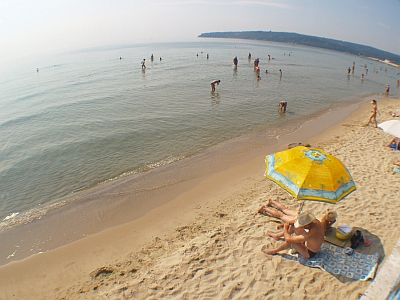Problems with coastal zone management
The coastal zone is an area where great numbers of human activities demand use of the coastal space and therefore it has a special role in protecting the sea. The sea has a profound influence on the coastal environment and its use by the people. But human use also has a profound influence on the environmental state of the coastal waters. The habitats of many plant and animal species in the coastal zone are more numerous than other places in the sea. For the people the coast is the area where they come into contact with the sea. The environmental health of the coast has a direct influence on the health of the local population and the tourists. The coastal zone is particularly vulnerable to pollution and damage, both direct and indirect, from human activity. The destruction or pollution of habitats there can destroy or drive away dependent species thus influencing the entire food chain all the way up to humans. Insufficiently treated wastewaters may contain pathogens, as for example the microbiological contaminants causing hepatitis-A or meningitis. The poor quality of coastal waters has a negative influence not only on life in the sea but also on tourism and the whole coastal economy.
The environmental health of the coast has a direct influence on the health of the local population and the tourists. The coastal zone is particularly vulnerable to pollution and damage, both direct and indirect, from human activity. The destruction or pollution of habitats there can destroy or drive away dependent species thus influencing the entire food chain all the way up to humans. Insufficiently treated wastewaters may contain pathogens, as for example the microbiological contaminants causing hepatitis-A or meningitis. The poor quality of coastal waters has a negative influence not only on life in the sea but also on tourism and the whole coastal economy.The economic activity of municipalities along the Black Sea is of particular significance for protecting the sea. The future of many plant and animal populations as well as human welfare depends on the wise decision-making for the future made in those municipalities. It is a pity that the Black Sea coast provides plenty of evidence for unwise planning. One economic use of the coastal zone quite often denies opportunities to other activities. The construction of coastal highways limits the development of coastal tourism and wildlife reserves. The construction of hotels on the beach and in the immediate vicinity of the shore puts a burden of waste from human activities on the environment and the quality of the beach and the coastal waters deteriorate.
The growth of beach resorts is a reason for concern. In many places the restrictions on construction are not observed. Powerful interest groups are trying to take entire sections of the coast that contain the most significant biodiversity. Many hotels, both new and old discharge much of their waste straight into the waterways without treatment. Even this changing of the local environment can have huge effects. Industrial enterprises also contribute to the coastal pollution. Farming can cause nutrients and pesticides, harmful to the marine environment and human health, to be washed into the water through runoff. The felling of trees can lead to unstable topsoil, leading to erosion, which has become a very serious problem for the Bulgarian coast. Even dams and dikes can stop the flow of important sediments into the sea, thus weakening beaches that act as normal storm breakers.
One of the reasons for the chaotic development of our coast is the fact that so far the interests of all legitimate users have not been recognized. All too often the various administrations and businesses pursue their narrow interests without much communication between each other and without discussing their future plans. To protect the coast however we need to make long term integrated planning and to recognize the legitimate interests of all users that may be affected by a certain change.
The process is well known as Integrated Coastal Zone Management. It involves compromise and insurance of strict environmental standards. The construction of an industrial complex or a port on the coast would be incompatible with the development of tourism and may also destroy some valuable protected territory. It is difficult to take into account everybody’s demands, though it is of particular importance for powerful business interests to realize that the cheapest option may not always be the most sustainable.
The instruments for implementation of the Integrated Coastal Zone Management is the effective enforcement of regulations and environmental impact assessment, which is a method of consideration of all possible environmental effects resulting from a given project or policy.


